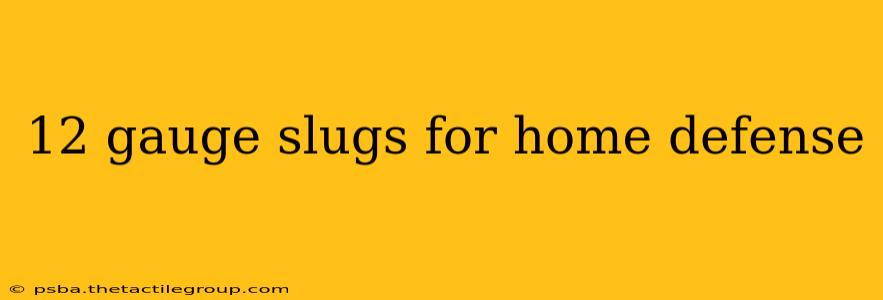Choosing the right home defense firearm is a serious decision, demanding careful consideration of various factors. While shotguns are a popular choice, understanding the ammunition you select is equally crucial. This guide delves into the specifics of using 12 gauge slugs for home defense, weighing their advantages and disadvantages to help you make an informed choice.
Why Consider 12 Gauge Slugs?
12 gauge slugs offer several compelling advantages for home defense:
-
Stopping Power: Slugs deliver significantly more stopping power than birdshot or buckshot. Their solid projectile design translates to greater penetration and energy transfer upon impact, potentially incapacitating a threat more quickly. This is a critical factor in a high-stress home defense situation.
-
Penetration: This is both an advantage and a disadvantage (discussed below). The significant penetration of a slug can be vital for reaching a threat through obstacles like doors or walls, although this must be carefully weighed against the risk of overpenetration.
-
Accuracy: While not as inherently accurate as some rifle rounds at longer ranges, modern slugs are designed for improved accuracy at typical home defense distances. This accuracy is enhanced by using a rifled shotgun barrel, further improving projectile trajectory and stability.
Disadvantages of 12 Gauge Slugs for Home Defense
Despite their advantages, 12 gauge slugs present some limitations for home defense:
-
Overpenetration: The significant penetration of a slug poses a considerable risk. A missed shot can easily travel through walls, floors, or ceilings, potentially injuring innocent bystanders or neighbors. This is the most significant drawback and requires meticulous shot placement.
-
Recoil: 12 gauge slugs generate substantial recoil. This can be difficult to manage, especially for individuals with less experience or physical strength. Excessive recoil can impact follow-up shots and accuracy, potentially compromising the effectiveness of your defense.
-
Limited Capacity: Compared to other home defense options like pistols or some rifles, shotguns typically hold fewer rounds. This necessitates precise shot placement and potentially limits your ability to engage multiple threats.
Alternatives to Consider
While slugs offer significant stopping power, it's important to consider alternatives:
-
Buckshot: Buckshot offers a balance between stopping power and a reduced risk of overpenetration compared to slugs. However, it also suffers from less accuracy and penetration than a slug.
-
Birdshot: Birdshot is generally considered unsuitable for home defense due to its limited stopping power and penetration.
-
Other Calibers: Handguns and rifles in calibers like 9mm, .45 ACP, or .223 Remington also offer effective home defense options. Each has its own pros and cons regarding capacity, recoil, and penetration.
Making the Right Choice
The decision of whether to use 12 gauge slugs for home defense depends on several factors:
-
Your Training and Experience: Are you comfortable and proficient with the significant recoil of a 12 gauge slug? Proper training is essential for safe and effective use.
-
Your Home Environment: Consider the layout of your home and the potential for collateral damage from overpenetration.
-
Your Physical Capabilities: Can you handle the recoil and operate the shotgun effectively under stress?
-
Your Threat Assessment: Evaluate the types of threats you are most likely to face.
Ultimately, the best home defense ammunition is the one you can handle safely and effectively in a high-stress situation. Consider professional training and consultation with law enforcement or firearms experts before making your decision. The choice is a personal one and should prioritize safety above all else. Remember that responsible firearm ownership includes understanding the capabilities and limitations of your chosen weapon and ammunition.

